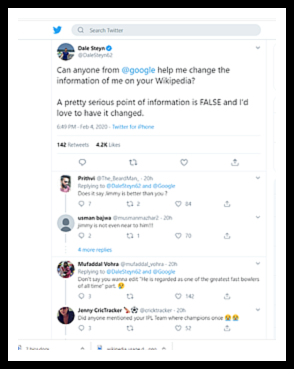Wikipedia: True or False?
Wikipedia likes to assert that all information included in an article is put up by voluntary, neutral editors who use sufficient secondary sources to back up statements. There is vigilant enforcement. Still, many thousands of people ask Google each day: How reliable is Wikipedia? Is the information on Wikipedia true?
The short answer is: Yes! The citations (little numbers/links included in the articles) lead to quality secondary sources. Presumably, the more references an article has, the more truthful the article.
Wikipedia ranks prominently because it has characteristics of an authority site (like Bloomberg or the New York Times) and also has characteristics of a crowd-sourced resource. It has the advantage of having real people fact-check and contribute, and when that process goes well, the result can be more authoritative to users even than a recognized news publication. Unlike major media, Wikipedia is meant to be safe from political leanings or editorial positions.
But, the long answer is: It’s complicated.
In February 2020, South African fast bowler Dale Steyn turned to Twitter for help when he discovered that his Wikipedia entry falsely stated he played for Zimbabwe.
His followers made a variety of suggestions/offers to “fix the problem” themselves. What most of them failed to suggest in their tweets, however, was the need for reliable sources to back up the claim that this sportsman did in fact play for South Africa and not Zimbabwe. Some of these well-intentioned advisors did indicate that the edit couldn’t be made by Steyn himself. Read more on that here.
True Tales of Wiki Woes
In January 2019, British actress Olivia Colman shared her story of trying to get her birthday corrected on Wikipedia. She was dismayed that the wiki-indicated day, month, and year were all wrong (making her eight years older than she really was.) All she wanted to do was correct wrong information. But her attempts to get the right date on her Wikipedia entry were met with retorts from wiki editors asking her to “prove it.” Colman pointed out that no citations were used to assert the false birthday and thus her avowal of the correct date should be enough. The Wikipedians ultimately reached a consensus and her actual birthday was included in the entry.
In 2012, award winning author Phillip Roth found factual errors in an entry about his own book, The Human Stain. He—the author himself—was pressed to attest to the veracity of these inaccuracies in the form of secondary sources. So Roth, being an esteemed writer, created the source himself. He wrote an article about his book, and his Wikipedia experience, and had it published in The New Yorker. Then it was legitimately used by an editor as the cited source to correct the misinformation.
On March 14, 2007, Sinbad’s Wikipedia page claimed he had died. Major news outlets reported the death; his manager received condolence calls; Sinbad himself was informed of his own passing when his daughter called his cell phone. Even after several interviews with leading radio and television stations in which he asserted himself as “alive and well,” Wikipedia insisted that the edit could only be reverted if it could be confirmed by a link-able secondary source. Eventually, the editors recognized the vandalism and reverted the falsehoods, but not before it became the subject of some of Sinbad’s stand-up routine.
There are countless more examples, but you get the idea…
The Fight for “Truthiness”
In May 1897, Mark Twain told a journalist, “the reports of my death are greatly exaggerated.” It is probable that had he encountered this problem sometime after 2001, when Wikipedia came to be, he too would have had to find reliable secondary sources by which to prove his own well-being.
Wikipedia’s verification policies are designed to ensure that all the information found on the open-source, cooperative platform is in fact true. By relying on secondary sources, Wikipedia presumes that sufficient research has been done to achieve a relatively high level of accuracy. Wikipedia even maintains a list of approved and deprecated sources designed to ensure the veracity of reported information.
But these same policies also create a loophole through which some falsehoods can trickle in, if these distortions were once reported as truths (as in the case of Roth and Sinbad). Similarly, the loophole allows for extra savvy Wikipedia consumers, like Phillip Roth, to produce a source designed specifically to counter the misrepresentation and set the record straight.
With sites in 300 different languages, over 40 million articles, and more than 200,000 editors/contributors, accessed by more than 1.4 billion unique devices (mobile and desktop) each month, there’s a lot of information out there in the Wiki-verse.
Some of that data we all know to be true, yet the “truthiness” of certain information seems somehow more reliable when we read it on Wikipedia. The term itself — coined by Stephen Colbert, and awarded “Word of the Year” in 2005 and 2006 — has its own Wikipedia entry, which has to be enough to make it an officially recognized (and acceptable) word in the English language.
All in all, while the Wikipedia system certainly has flaws, it is probably the best one there is, and we have found that it is better to work with the system than against it.



